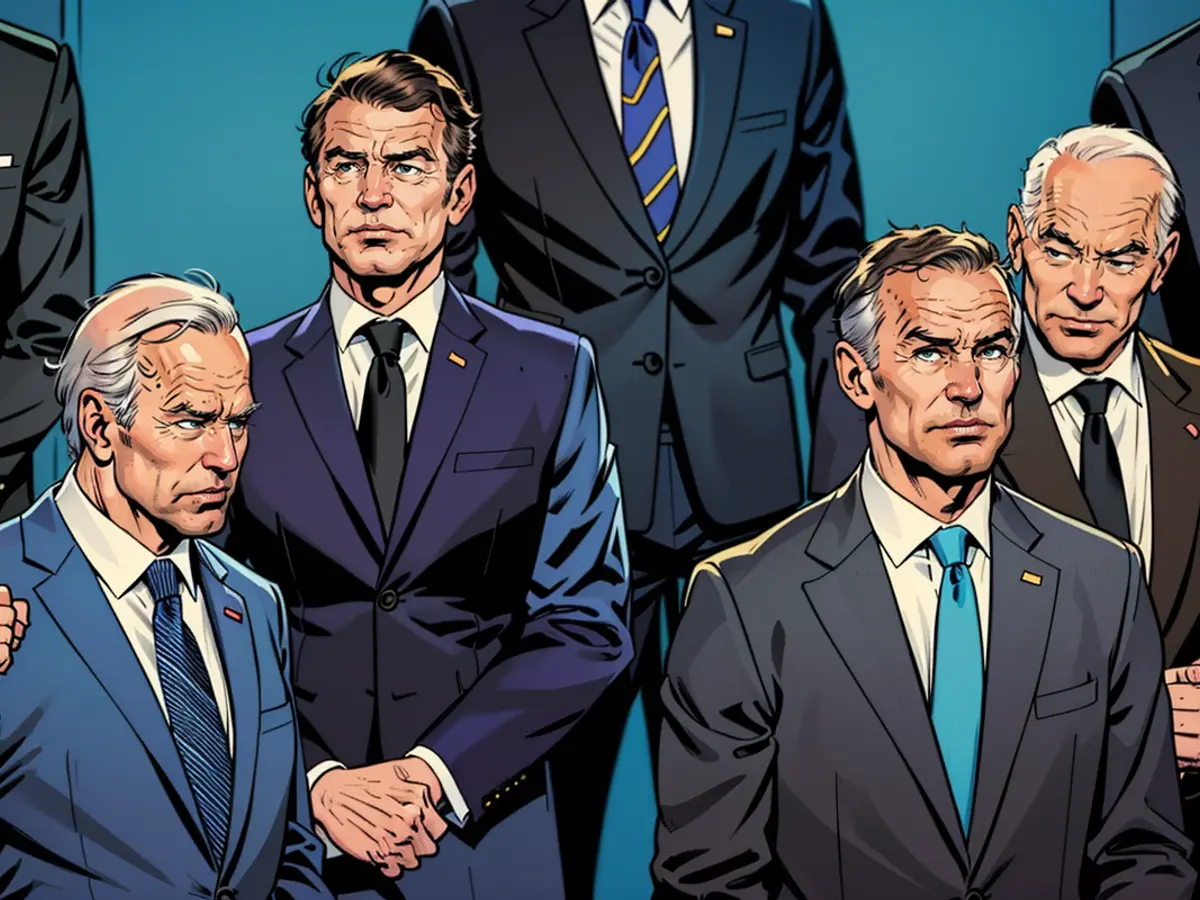NATO Summit - The Cold War is back
## Nato Reinforces Europe's Military Deterrence for its 75th Anniversary
At the Nato summit in Washington, the most decisive step is almost soundless – yet significantly impactful from a security policy perspective: The USA will deploy weapons systems in Germany starting from 2026, which can reach far into Russian territory. These systems are expected to include Tomahawk cruise missiles, which can technically be nuclear-armed, as well as SM-6 air defense missiles and newly developed hypersonic weapons, which are intended to reach further than previously stationed land-based systems.
The "advanced capabilities" of the USA demonstrated at the summit would showcase their commitment to Nato and their contribution to joint European deterrence, according to both the USA and Germany in just three sentences.
Nato Strengthens Europe's Military Deterrence
For Nato's 75th anniversary, the Cold War is back: The alliance is strengthening Europe's military deterrence because the Russian leadership under President Vladimir Putin refuses to end the aggression against Ukraine, and measures for mutual arms control have been abandoned. Moreover, the signs of a new bloc formation are intensifying, with the USA and Europe on one side and China and Russia on the other vying for influence in the world.
The Nato also accuses China of providing significant support for Russia's defense industry and the so-called boundaryless partnership in the summit's final declaration. "This increases the risk that Russia poses to its neighbors and European-Atlantic security," it states in the document.
The Nato aims to counter the impression that it is tired of the Ukraine conflict and weakened by internal differences. The "peace mission" of Hungarian Prime Minister Viktor Orban with visits to Moscow and Beijing is viewed skeptically by other alliance partners. Even US President Joe Biden, who is campaigning for the November election, receives support from the allies.
Scholz Wants to Live Up to "Special Responsibility"
German Chancellor Olaf Scholz (SPD) speaks confidently and makes it clear that Germany, as the largest country in Europe within the Nato alliance, will fulfill its responsibility as the largest economy in Europe. "Germany is the largest country in Europe within the Nato alliance. From this arises a unique responsibility," he says. "And I can clearly and explicitly say: We will live up to this responsibility." Such clear statements are rather rare from someone who would prefer to sell Germany as a "middle power."
However, the fact that US weapons will be stationed on German soil, which can reach Russia, is not without consequence for him. The fear that one could become the target of Russian weapons is quite widespread in Germany. Furthermore, there are not a few in the SPD who believe that the permission for the use of Western weapons against military targets on Russian territory contributed to the disaster for the SPD in the European election.
Anxiously Awaiting the US Election
The Nato summit in Brussels will be closely watched, especially in view of the upcoming US election. The outcome of the election could have significant implications for the future of the alliance. The US is the backbone of Nato, and its leadership role is crucial for the alliance's effectiveness. The uncertainty surrounding the election outcome adds to the already tense atmosphere in Europe.
German domestic politics currently pose no significant risk to NATO compared to the American one. In the United States, the presidential election is taking place in November, and the possibility of Donald Trump returning to the White House is a realistic scenario. Whether Trump would then reverse the deployment plans is at least possible. During his tenure from 2017 to 2021, the Republican had initiated a reduction of US military presence in Germany, which was later halted by Biden. Since the Russian attack on Ukraine, the incumbent president has even increased the US troop presence in Germany and Europe again.
Biden repeatedly assures that the United States will adhere unwaveringly to their commitments in the military alliance and will defend every inch of NATO territory. Trump, however, criticized the supposedly too low defense spending of European allies during his first term and threatened at times to withdraw the US from the alliance.
During the campaign, Trump stated that he would no longer guarantee American protection to NATO countries that did not fulfill their financial obligations – and in effect, encouraged Russia to do as it pleased with them.
Trump's statements do not indicate that he has an interest in engaging more strongly in NATO and deterring in Europe. Nothing suggests that he will change his stance. The Republican sees Europeans as more responsible. However, Trump might be able to win over the deployment of more advanced weapons systems in Germany. After all, the 78-year-old is also someone who likes to show off his muscles.
For NATO, the unpredictability of the potential Biden successor can even have something positive – after all, Putin also doesn't know what to expect from further provocations.
- The deployment of Tomahawk cruise missiles, SM-6 air defense missiles, and hypersonic weapons by the USA in Germany, starting from 2026, is part of their commitment to enhancing NATO's deterrence capabilities, as stated during the NATO summit in Washington.
- The strengthening of NATO's military deterrence is a response to Russia's continued aggression against Ukraine and its refusal to adhere to arms control measures, according to the alliance's leaders at the 75th anniversary summit.
- At the NATO Summit, Germany, as the largest country within the alliance, affirmed its special responsibility to uphold its commitments, with Chancellor Olaf Scholz assuring that Germany will live up to its unique role in the alliance.
- The potential election of Donald Trump as the US President could lead to a reversal of the current deployment plans, as he had previously criticized European allies for low defense spending and threatened to withdraw from NATO.
- The uncertainty surrounding the US election outcome is adding to the already tense atmosphere in Europe, with the outcome having significant implications for the future of the NATO alliance and its military deterrence.
- In response to China's significant support for Russia's defense industry and boundaryless partnership, the NATO summit's final declaration accused China of increasing the risk of conflict with its neighbors and European-Atlantic security.
- The deployment of advanced weapons systems in Germany, which can reach into Russian territory, has raised concerns in Germany, with fear of becoming a target and the perception that it may have contributed to the SPD's poor performance in the European election.









